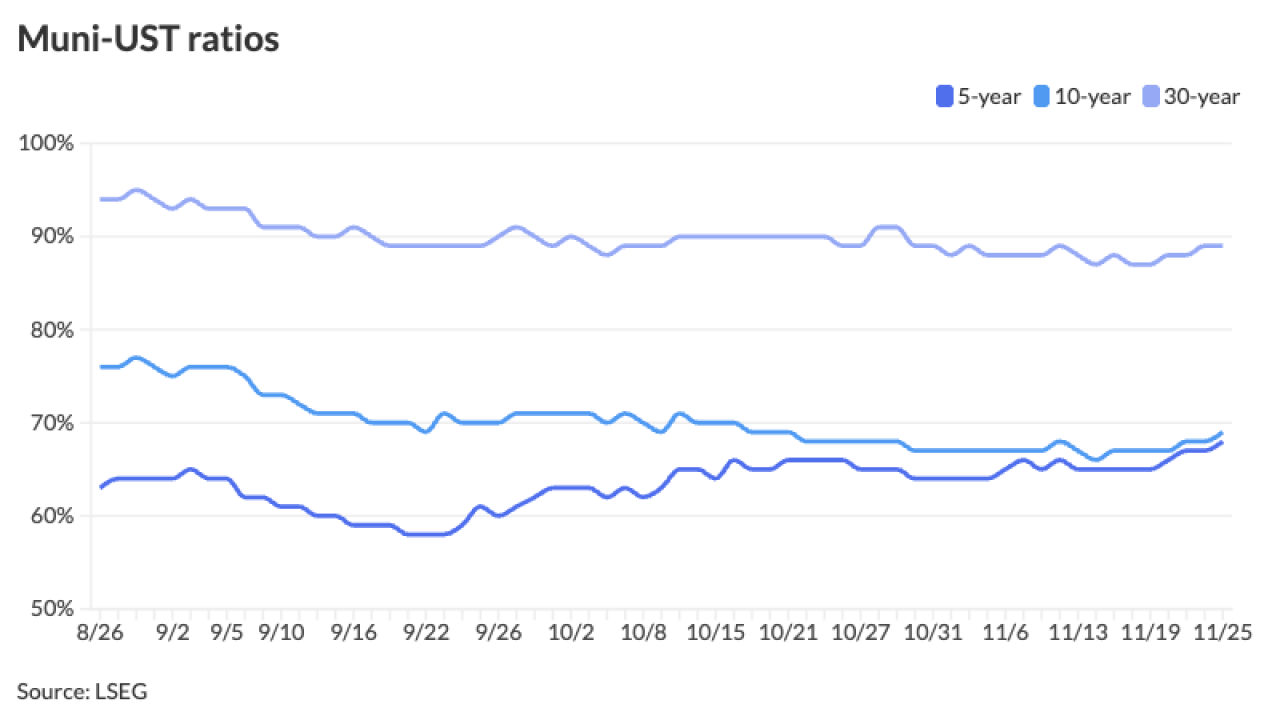Municipal credits are swirling downwards as Texas utilities seek to recover billions of dollars lost in a winter power crisis.
“These costs dwarf the anticipated financial impact of the coronavirus pandemic, highlighting the heightened social risks facing utilities in times of severe commodity price volatility,” analysts at Moody’s Investors Service said in a report on the utility sector.
The organization in charge of the state’s power grid, the Electric Reliability Council of Texas, overcharged customers more than $16 billion during the storm that struck the week of Feb. 14, according to a consultant for the Public Utility Commission of Texas.

Potomac Economics, a Virginia-based firm that evaluates ERCOT’s performance, last week recommended that the overcharges be reversed by retroactively lowering wholesale electricity prices over a 32-hour period beginning Feb. 18.
The surge of energy prices over a four-day period to a peak of $9,000 per megawatt hour has already led to bankruptcy for one major electric co-op and brought downgrades or outlook shifts to other public utilities.
Moody’s Investors Service on Friday downgraded ERCOT’s issuer rating to A1 from Aa3, and lowered the outlook to negative from stable.
"ERCOT is being heavily criticized by political leaders and other stakeholders, has been subject to several lawsuits, and did not receive $2.5 billion of payments for market transactions due to payment defaults following the cold weather event," wrote Toby Shea, senior credit officer at Moody’s. "The downgrade reflects higher reputational and regulatory risk for ERCOT and uncertainty over potential changes to or reforms of the Texas power market in the wake of these developments.”
ERCOT balanced its $2.5 billion shortfall by drawing on $800 million of cash deposit collateral from its congestion revenue rights account and short-paid the rest of the market by about $1.7 billion, Moody’s said.
“Counterparties that have been short-paid large amounts will likely pressure the PUCT and ERCOT to accelerate the process by which the amounts will be paid,” Moody's analysts wrote. “Under the existing ERCOT protocols, it could take something in the order of 80 years to complete the repayment process.”
San Antonio’s CPS Energy, one of the largest public utilities in the state, took a two-notch downgrade from Fitch Ratings after announcing that the storm had cost it about $1 billion to buy power from ERCOT.
The Fitch downgrade to AA-minus comes with a negative outlook that reflects CPS's weakened financial profile, analysts said. The downgrade removes the San Antonio utility from the rating watch negative on which Fitch placed all retail and wholesale electric utilities operating within the ERCOT footprint Feb. 24.
CPS plans to use its commercial paper and floating rate revolving note programs, in addition to its unrestricted cash and a recently board-approved line of credit, to address the utility's short-term liquidity needs, Fitch noted. The utility then plans to convert short-term liquidity loans and CP into long-term debt.
“Fitch estimates leverage, measured as net adjusted debt to adjusted funds available for debt service, could approach 10x at fiscal year-end 2022 with the addition of $1.1 billion in debt,” analysts said. “This represents a substantial increase from the utility's leverage of 6.5x at FYE 2020.”
On March 1, Brazos Electric Power Cooperative, with 1.5 million customers in Central Texas filed for Chapter 11 bankruptcy, declaring that it could not pass on the cost of power purchased from ERCOT to its customers.
Likewise, CPS is vowing to protect its customers from excessive charges and has suspended its disconnection program for nonpayment of bills.
CPS suspended billing for customers on Feb. 19 to confirm that energy bills did not include any rate changes or fuel adjustment costs related to the historic winter storm, officials said.
The Texas Public Utilities Commission that oversees ERCOT has seen leaders depart under heavy criticism from Gov. Greg Abbott and others who sought to deflect blame for failing to winterize the grid
Seven of ERCOT’s 15 board members have resigned and the board fired chief executive Bill Magness.
DeAnn Walker resigned as PUC chair on March 1.
The U.S. House of Representatives Environmental Subcommittee has opened an inquiry and requested documents from ERCOT related to the outages.
“These developments have increased political and regulatory uncertainty for ERCOT as it grapples with how to address payment shortfalls in the Texas power market,” Moody’s said.
Along with Texas, utilities in Oklahoma, Kansas and neighboring states were also affected by strained liquidity and soaring supplier bills.
Among investor-owned utilities, ratings have also fallen, and one retailer in Texas, Griddy, was shut down by the PUC after passing on bills to customers as high as $15,000. Griddy sold power to individual retail customers at wholesale rates, which became problematic when those rates soared during the cold snap.
“Moreover, the widespread anger sparked by surging customer bills . . . call into question the ability of utilities to recover fuel and purchased power costs in a timely manner,” Moody’s analysts said.
The power crisis plagues the state as Abbott seeks to reopen the state’s businesses and end a mandate to wear masks during the COVID-19 pandemic that was declared a national emergency one year ago.
Abbott, who before the storm considered "election integrity" an emergency item for the Texas Legislature, quickly added the electricity crisis to the session agenda after Republican leaders were caught flat-footed.
“When Texans were in desperate need of electricity, ERCOT failed to do its job and Texans were left shivering in their homes without power," Abbott said after the board members resigned. "ERCOT leadership made assurances that Texas’ power infrastructure was prepared for the winter storm, but those assurances proved to be devastatingly false. The lack of preparedness and transparency at ERCOT is unacceptable, and I welcome these resignations. The State of Texas will continue to investigate ERCOT and uncover the full picture of what went wrong, and we will ensure that the disastrous events of last week are never repeated.”





